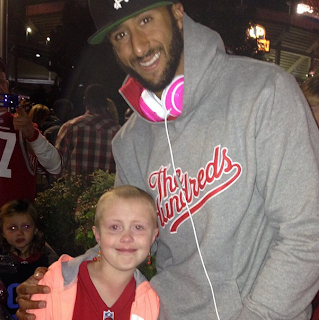Stories, Branding and Two Quarterbacks Who Have More In Common Than You Think
Education Rethink 2014-01-13
I saw this posted on Facebook last night. Seven people in my news feed posted it. The message above is clear. There is a moral imperative to root for Seattle, because their quarterback is a better person. It sort-of looks like Russell Wilson is an upstanding guy and Colin Kapernick is a jerk. That's the image that the media portrays and that's the story that has been written about him. It's easy to believe this when those are the pictures that are cherry-picked. Notice that this comparison doesn't include this picture: 
Or this one for that matter.
It doesn't matter that Kapernick loves his family. It doesn't matter that the tattoos that people view as sinful are mostly Bible verses. It makes no difference that he volunteers for children's hospitals, has a camp for kids with heart issues and visits troops. Go look at his Instagram feed and you'll see him hanging out with soldiers, kids in hospitals and his family. None of that matters. The verdict is out. He's a selfish jerk because he kisses his bicep when he scores a touchdown and he sometimes acts like an immature twenty-something. So, how does this connect to the classroom?
First, it has me thinking about the whole concept of branding. I don't know Kaepernick. He might be a jerk. But when I see his Instagram feed, I see what I expect to see from a 26 year old: pictures of food, of friends, of family, of big events. I see a story instead of a PR campaign. And for what it's worth, when I think about digital citizenship, I hope my students don't feel like they have to project and image and build a brand and come off as Superman. Second, I think we have cultural double standards when it comes to how we view behavior. Brett Favre cheated on his wife. Big Ben Roethlisberger was arrested twice for rape. They get a pass, because they have a "good ol' tough boy" persona. Wilson, being black, has to be perfect. Manning is confident. Newton is arrogant. I think this carries over into the classroom. Finally, I think it goes back to the notion that we never know the whole story. We get students in our classrooms and assume we know who a kid is based upon a cumulative folder or a story from a past teacher. Often, students have their stories made up for them before they step foot in a classroom and it's just as bad as the biased side-by-side comparison of Wilson and Kaepernick. 

